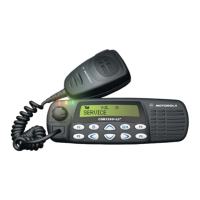2-4 Theory of Operation
2.2.3 Emergency
The emergency switch (J0501, pin 9), when engaged, grounds the base
of
Q0662 via the
EMERGENCY CONTROL line. This switches Q0662 off and resistor R0662 pulls the collector
of
Q0662 and the base
of
Q0663 to levels above two volts. Transistor Q0663 then switches on and
pulls the collector
of
the npn transistor within Q0661 to ground level This enables the voltage
regulators via Q0641 . When the emergency switch is released, R0541 pulls the base
of
Q0662 up to
0.6 volts causing the collector of transistor Q0662 to go low (0.2 volts), switching Q0663 off.
While the radio
is
on, the
~P
monitors the voltage at the emergency input on the accessory
connector via pin
60
and the GP5
IN
ACC9 line. Three different conditions can exit: no emergency,
emergency, and open connection to the emergency switch. If no emergency switch
is
connected or
the connection to the emergency switch is broken, the resistive divider R0541/R0512 sets the
voltage to about 4.7 volts. If an emergency switch is connected, a resistor to ground within the
emergency switch reduces the voltage on line GP5
IN
ACC9 to inform the
~P
that the emergency
switch
is
operational. An engaged emergency switch pulls line GP5
IN
ACC9 to ground level. Diode
D0179 limits the voltage to protect the
~P
input.
While the EMERGENCY CONTROL signal is low and INT SW
8+
is on, the
~P
starts execution,
reads that the emergency input is active through the voltage level
of
line GP5
IN
ACC9, and sets the
DC POWER
ON
output
of
the ASFIC
CMP,
pin
13
to a logic high. This keeps Q0661 and Q0641
switched to allow a momentary press
of
the emergency switch to power up the radio. When the
~p
has finished processing the emergency press, it sets the DC POWER
ON
line to a logic
0.
This turns
off Q0661 and the radio turns off. Notice that the
~Pis
alerted to the emergency condition via line
GP5
IN
ACC9. If the radio is already on when the emergency
is
triggered, the DC POWER ON
signal
is
already high.
2.2.4 Mechanical On/Off
This refers to the on/off/volume knob located on the control head which
is
used to turn the radio on
and off and control the volume.
If the radio is turned off and the on/off/volume knob is pressed, line
ON
OFF CONTROL (J0401, pin
11) goes high and switches the radio's voltage regulators on as long as the button
is
pressed. The
~Pis
alerted through line ON OFF SENSE (U01 01, pin
6)
which is pulled to low by Q0110 while the
on/off/volume knob
is
pressed. In addition, an interrupt is generated at
~P
.
pin 96. The
~p
asserts
line DC POWER ON via ASFIC
CMP,
pin 13 high which keeps the radio switched on. The
~P
switches the radio off by setting DC POWER ON to low via ASFIC CMP pin 13.
2.2.5 Ignition
Ignition sense prevents the radio from draining the vehicle's battery because the engine is not
running.
When the
IGNITION input (J0501, pin 10) goes above 5 volts, Q0661
is
turned on via line IGNITION
CONTROL. Q0661 turns on INT SW
B+
and the voltage regulators by turning on Q0641 and the
~P
starts execution. The
IJP
is alerted through line GP6
IN
ACC1
0.
While the on/off button
is
pressed, a
high signal turns Q0181 on, which pulls
IJP,
pin 74 to low. If the software detects a low state it
asserts DC POWER ON via ASFIC, pin
13
high which keeps Q0661 and Q0641 and the radio
switched on.
When the IGNITION input goes below 3 volts, Q0181 switches
off
and R0181 pulls
IJP.
pin 74 to
high. This alerts the software to switch off the radio by setting DC POWER ON to low. The next time
the IGNITION input goes above 5 volts the above process is repeated.

